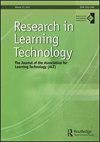Digital media assignments in undergraduate science education: an evidence-based approach
IF 1.2
Q2 EDUCATION & EDUCATIONAL RESEARCH
引用次数: 2
Abstract
Digital media assignments empower students to become co-creators of knowledge rather than passive consumers of content. The Internet explosion and the affordability of digital technologies and devices such as smartphones, tablets and action cameras have created opportunities to use digital media in the classroom. This article aims to present an evidence-based approach to help educators to design, implement and evaluate digital media assignments in the classroom. For this purpose, four theoretical models were tested to inform the design of digital media assignments in undergraduate science education. These models helped to identify the student training in digital media needed, develop effective marking rubrics, and inform the design, implementation and evaluation of digital media assessment tasks. Trials were conducted in Spring 2016 (n = 458) and Autumn 2017 (n = 1329), respectively. Data collection used a mixed-methods approach, including a qualitative survey, open-ended questions, group contribution data and marks attained. Data analysis showed positive outcomes of the systematic implementation of digital media assignments. In conclusion, students enjoyed the support they received, being creative, working in groups and learning with digital media. To date, this intervention is one of the most comprehensive and practical approaches to digital media assignments in the classroom, which has been undertaken.本科科学教育中的数字媒体作业:基于证据的方法
数字媒体作业使学生成为知识的共同创造者,而不是被动的内容消费者。互联网的爆炸式增长,以及智能手机、平板电脑和运动相机等数字技术和设备的可负担性,为在课堂上使用数字媒体创造了机会。本文旨在提出一种基于证据的方法来帮助教育者在课堂上设计、实施和评估数字媒体作业。为此,我们测试了四种理论模型,以指导本科科学教育中数字媒体作业的设计。这些模型有助于确定学生在数字媒体方面所需的培训,制定有效的评分标准,并为数字媒体评估任务的设计、实施和评估提供信息。试验分别于2016年春季(n = 458)和2017年秋季(n = 1329)进行。数据收集采用混合方法,包括定性调查、开放式问题、群体贡献数据和获得的分数。数据分析显示系统实施数字媒体作业的积极成果。综上所述,学生们很喜欢他们所获得的支持,他们很有创意,在小组中工作,并通过数字媒体学习。迄今为止,这种干预是在课堂上进行的数字媒体作业中最全面和最实用的方法之一。
本文章由计算机程序翻译,如有差异,请以英文原文为准。
求助全文
约1分钟内获得全文
求助全文
来源期刊

Research in Learning Technology
EDUCATION & EDUCATIONAL RESEARCH-
CiteScore
6.50
自引率
0.00%
发文量
13
审稿时长
20 weeks
 求助内容:
求助内容: 应助结果提醒方式:
应助结果提醒方式:


